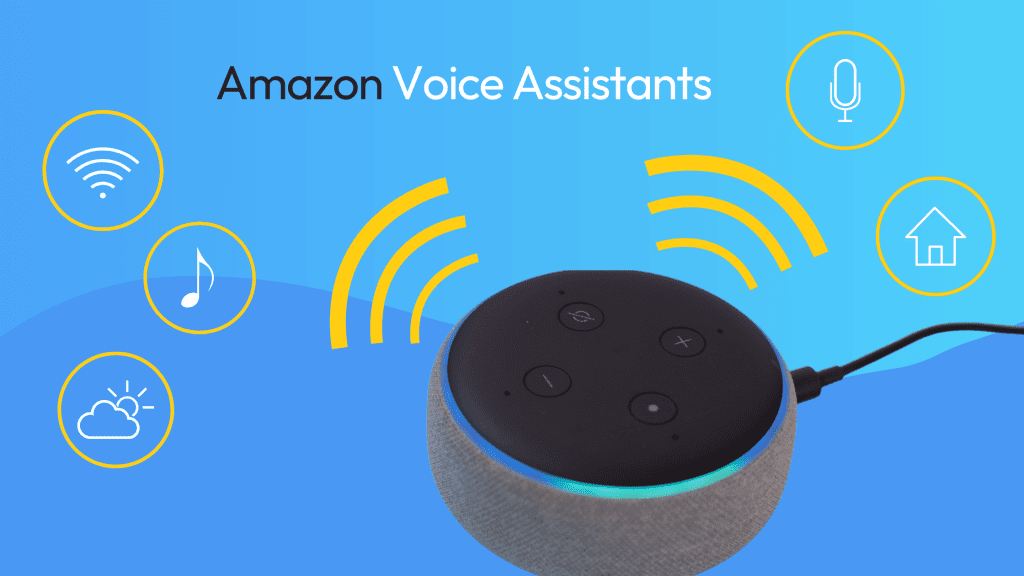Amazon voice assistants – love them or hate them?
Last week a friend posted a photo on Facebook of two 12-pack boxes of shelf-stable single serve chocolate milk bottles from Nesquik. “Y’all,” the post read. “My 4 year old ordered these yesterday by saying ‘Alexa, please order me chocolate milk.'” She confirmed what I’d already worried about- with Alexa in my home, my kids can pick up some bad habits.
Alexa is a fairly new addition to our house. She was a gift at Christmas from my parents, and my husband and I resisted setting her up for several weeks. At our seven year old’s insistence, we finally relented. “Mom, she’s so cool,” my daughter would constantly tell us. “She can play music and tell you facts and let you know what today’s weather is!”

Amazon Voice Assistants: What We Love About Alexa
Before we had Alexa, I really didn’t know why we needed a voice assistant. Was it really so hard to look on your tablet to know what today’s weather would be like? Or could my daughter not just ask to borrow my phone to look up a random fact she just had to know right now?
But, as it turns out, Alexa has many cool uses.
- Alexa can let my kids know what today’s weather will be like so they know how to dress for school
- Alexa can set a timer so my kids know how long they have to read/clean their rooms/do another timed activity I request of them
- Alexa can play any song my kids want to hear (as long as it is available on Amazon music, for which we have a paid subscription)
- Say, “Good Morning, Alexa,” and Alexa will tell you a fact for the day. My kids love hearing the daily fact and recite it if they get the chance. I feel confident they will one day win Jeopardy with all the random knowledge they have gained with this ritual.
- Say, “Good Afternoon, Alexa,” and Alexa will tell you a joke of the day. My husband loves adding these jokes to his file of corny dad jokes.
- Say, “Good Evening, Alexa,” and Alexa will give you another fact of the day.
- Alexa can be programmed to work with a number of smart devices in your home, from thermostats to lights and TVs to cameras. She can help you automate your day in so many ways.
Amazon Voice Assistants: What We Don’t Love About Alexa
Digital voice assistants, like everything else in life, come with a list of cons that you should consider before setting up Alexa, or another AI assistant, in your home.
Security concerns are big with voice assistants. You can never be totally sure what Amazon or Google is doing with your information, and, when they are invited into your home, what are they actually doing with all of the data they are collecting from the conversations they hear inside your home? There is a lot of controversy surrounding these home voice assistants and the data they collect and store when these devices sit on your counter and collect your every word.
But, privacy concerns aside, is having a voice assistant that can do so much for you all it’s cracked up to be? Here are some of the downsides of kids having constant access to Alexa:
- If your voice assistant is tied to your Amazon account, kids can order items directly from their voice assistant, like my friend’s daughter did. You can put a stop to this by disabling voice ordering on Alexa.
- If your kid comes to rely on Alexa to do things for him, he isn’t necessarily learning to rely on himself to complete tasks. No need to remember to turn out the lights in your bedroom if you can just tell Alexa to. No need to remember to get on a Zoom call at 10 am if Alexa can just remind you to do it. There is something lost when you don’t have to be responsible for completing tasks yourself.
- Some suggest that AI offers the wrong kind of companionship for young kids, who may use Alexa as a model companion and, in turn, not respond well with real-life friendships. After all, if you don’t like a song Alexa is playing or a joke she is telling, you can simply command “Alexa, off,” and you are no longer subjected to what she has to say. In a real friendship, this sort of behavior wouldn’t be tolerated. A friend might choose to end her relationship with a child who thinks a conversation only needs to be one-sided, as is the case with Alexa.
- Alexa feeds our need for instant gratification. No more waiting and hoping your favorite song comes on the radio or learning a fact by reading in a reputable article or book. Alexa can give you music and information any time. While this isn’t always a bad thing, sometimes it helps to have context for facts or to know where Alexa is getting her information.